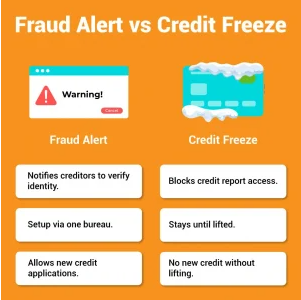Credit Freezes vs. Fraud Alerts: Which One Do You Need?
Identity theft is on the rise, and protecting your credit has never been more important. If you’ve ever worried about someone opening accounts in your name, you’ve likely come across two key tools: credit freezes and fraud alerts. Both offer protection, but they work in very different ways.
So, which one do you need? Let’s break it down.
What Is a Credit Freeze?
A credit freeze (also known as a security freeze) locks down your credit file. When your credit is frozen, lenders cannot access your credit report. Since most lenders require a credit check before approving a loan, credit card, or line of credit, a freeze effectively prevents identity thieves from opening new accounts in your name.
-
Pros:
-
Strong protection against new accounts being opened fraudulently.
-
Free to place and lift (thanks to federal law).
-
Doesn’t affect your credit score.
-
-
Cons:
-
Inconvenient if you need to apply for new credit you’ll have to temporarily lift the freeze.
-
Must be placed with all three credit bureaus (Experian, Equifax, TransUnion).
-
What Is a Fraud Alert?
A fraud alert doesn’t block access to your credit file but instead requires creditors to take extra steps to verify your identity before opening new accounts. For example, they may call you directly to confirm the application.
There are three types:
-
Initial fraud alert: Lasts 1 year (renewable).
-
Extended fraud alert: Lasts 7 years (requires a police report or identity theft affidavit).
-
Active duty alert: Lasts 1 year and is designed for military members on deployment.
-
Pros:
-
Easier than a freeze only needs to be placed with one bureau (they’ll notify the others).
-
Still allows you to apply for credit without lifting restrictions.
-
Free to set up.
-
-
Cons:
-
Doesn’t block access to your credit report.
-
Relies on lenders taking verification seriously—so it’s not as strong as a freeze.
-
Key Differences at a Glance
| Feature | Credit Freeze | Fraud Alert |
|---|---|---|
| Blocks access to credit file? | ✅ Yes | ❌ No |
| Requires identity verification by lenders? | ❌ No | ✅ Yes |
| Ease of setup | Must contact all 3 bureaus | Only contact 1 bureau |
| Duration | Until you lift it | 1–7 years depending on type |
| Best for… | Maximum protection, long-term security | Added layer of protection, temporary concerns |
Which One Should You Choose?
-
Choose a credit freeze if:
-
You’ve been a victim of identity theft.
-
You rarely apply for new credit and want maximum protection.
-
You want to prevent anyone (including yourself) from opening new accounts without unfreezing first.
-
-
Choose a fraud alert if:
-
You suspect fraud but still want to apply for new credit occasionally.
-
You want a lighter layer of protection that’s easier to manage.
-
You’re in the military and need added security while deployed.
-
Final Thoughts
Both credit freezes and fraud alerts are free, effective tools for protecting your financial life. A fraud alert is convenient and offers extra verification, while a credit freeze provides the strongest defense against identity thieves.
If you want maximum security, go with a freeze. If you want flexibility and lighter protection, a fraud alert may be enough. In some cases, using both together can provide the best of both worlds.


